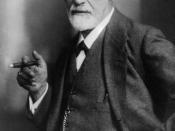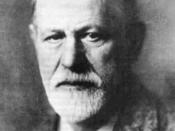From ancient Greek mythology looms Thanatos. Beautiful to the visual sense, the winged youngster often seen with a lit torch in one hand and a butterfly or a wreath in the other. He was breathtaking and cupid-like. However, unlike his mother Nyx (Goddess of night) and his brother Hypnos (God of sleep), Thanatos was never popular. He was
the undertaker of Greek mythology. Thanatos was the God of Death.
Greek mythology may have taken a back seat to other beliefs in this day and age, but Thanatos can still be seen raising his God-like
head in the study of Psychology. In 1896 Sigmund Freud graced the world of Psychology with yet another one of his theories. Freud believed that humans possessed insticts which drove them to destruction of life, exhibited in such behaviors as wars, aggression, the urge to kill, the desire to harm, and all other behaviors which lead to the extinction of life.
Humanity not only yearns for life and immortality but, according to the wishes of Thanatos, desires to return to the inanimate, inorganic, state of nature from whence it sprung. In other words,Thanatos, also called Freuds "death wish", in not necessarily the
desire to die in the sense that we today see it, but the want and need to remain at rest. Freud believed that it was Thanatos that gave people the desire to take risks. After all, would sky diving or riding a roller coaster be as much fun with out Death loaming over your
shoulder?
Like many others who have studied Freud and his many theories, I find very little reasons to his rhymes. Freud himself could hardly come up with reasoning behind most of his theories. With his fixation on sexual drives, his books seem more like pornography for the Victorian Era, then...


